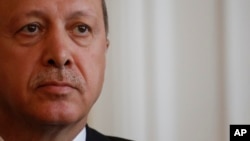A Turkish prosecutor's call to close TV stations linked to Islamic cleric Fethullah Gulen has added fuel to growing criticism that state and most other media outlets are biased in favor of the government ahead of June’s general election.
Gulen is accused of conspiring against the government. The TV stations are among the few remaining media outlets critical of the ruling AK Party.
Political scientist Cengiz Aktar of Istanbul’s Suleyman Sah University said the closure of the stations would add to growing concerns over the fairness of the June 7 general election.
"It will lessen the media outlets capable reporting properly what is really happening during the campaign," he said. "Already it’s difficult to talk about a free election because the majority of the media outlets are openly working for the ruling party and press freedom is under very serious threat as pointed [out] by European Union ... [the] Council of Europe and America."
The Organization for Security and Co-operation in Europe, OSCE, is monitoring the election and has voiced concern about the fairness of the media.
Kemal Kilicdaroglu, leader of the main opposition Republican People’s Party has strongly condemned any threat to close TV stations.
And some pro- government newspaper columnists have echoed voiced concern about such a potential move.
The ruling AK Party has not commented on the reports.
The controversy comes as President Recep Tayyip Erdogan's accused a leading newspaper critical of the government and its owners of conspiring against him and the government.
Erdogan, a founding member of the ruling party, is bound by the Turkish Constitution to be impartial.
But since the start of the general election, he has embarked on a nationwide speaking tour, in which he routinely attacks all the opposition parties.
The speeches are carried live by state media and numerous private TV channels. Along with extensive coverage of the prime minister’s speeches, observers said little airtime is given to the opposition.
Despite protests by all opposition parties and claims of violation of electoral law, government minister Nesrin Ulema denied any wrongdoing.
She said it is not true because "our Supreme Election Council and election laws secure the equal broadcast rights for all the parties after the election campaign period starts."
She added that "there might be such a perception or a feeling that AK Party has more weight since our president is also out in the field. But he is the first ever president who was elected by the nation's votes."
Political columnist Kadri Gursel of Turkey’s Milliyet newspaper warned the country is heading in a dangerous direction, given "an ongoing deepening crisis of justice."
"There is no legal body to stop and punish violation of the constitution, violation of electoral law and limited access of opposition parties to mainstream media," he said. "And then it’s enough to create an authoritarian system, which makes it almost impossible for an opposition parity to make gains in elections."
Adding to growing concerns over media freedom are reports of conglomerates with large media holdings having received significant tax writeoffs in the run-up to the election.
The ruling AK Party has strongly denied allegations of impropriety. But observers warn both national and international concerns are growing over the health of democracy and the June election.




